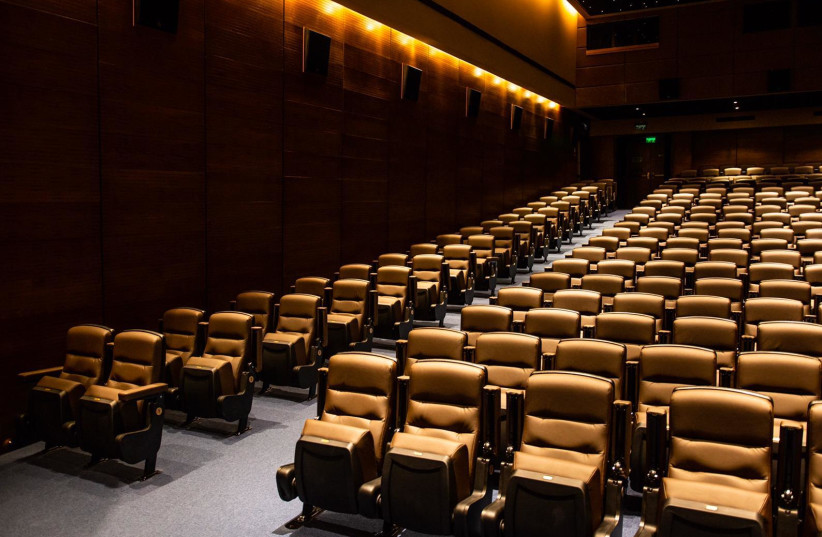At one time, director Shemi Zarhin was known for his crowd-pleasing movies – especially two very popular films, Aviva, My Love and Bonjour Monsieur Shlomi – so expectations are high when he releases a new film. In Hemda, his latest movie, which opened throughout Israel on June 6, he tries to tell a complex story about an older couple that has much promise, but collapses under the weight of an overly complicated plot and underdeveloped characters and story lines.
Zarhin’s previous film, Silent, an earnest mess meant to deliver thought-provoking insights into politics and media, came out in 2022, and he quickly followed it up with Hemda. Like all his movies, this new one has a terrific cast, headed by Sasson Gabay (The Band’s Visit) and Assi Levy (Black Space, Longing), who previously teamed up in Aviva and are the best reasons to see this film.
They play a couple – Sassy (Gabay), 73, and Effie (Levi), 50 – who go together to visit a doctor regarding follow-up from Sassy’s prostate cancer operation, because even two years after the surgery, he is still impotent. They barely have time to process the doctor’s advice – give up because the operation to correct his condition would be complicated and risky – before they have to get back to their daily round of part-time jobs.
Sassy had an army career and should be enjoying a comfortable retirement, but his son Dror (Roy Assaf), from his first marriage and now living in Brussels, is a compulsive gambler and racked up huge debts, which Sassy and Effie are devoting themselves to repaying.
TOGETHER, the couple bake hundreds of pastries every week that are sold in restaurants. On his own, Sassy is a security guard in a library and collects recycled plastics in the Upper Galilee community where they live. The multitalented Effie does hydrotherapy at a local pool and directs a musical ensemble at a community center preparing for a Hanukkah concert.

Every day, they can barely remember what they need to take with them when they leave home. But they get through it all with good humor, relying on clever, cute wordplay based on songs, biblical verses, and poetry. Sassy is clearly disturbed by his inability to perform sexually, but they don’t have much time to talk about it.
When does the plot get going?
This is just the basic setup. The plot gets going when two young men come back into their lives. One is Omri (Maor Levi), Sassy’s grandson, who disappears from his home with his unstable gambler father and turns up in theirs one day. Torn between guilt at abandoning his needy father and passion for girls, he spends his days entertaining his girlfriend when Effie and Sassy are slaving away at their jobs.
The second young man who upends their lives is David (Adi Alon), a war hero trying to heal from a leg injury, with whom Effie had a sexual relationship when he was 17. He comes to the pool where she works, insisting on being treated by her.
This isn’t all that’s going on. Omri does not want to attend a memorial service for his mother, who passed away years ago, while Sassy’s daughter has problems with her own rebellious daughter. There are scenes of Sassy chatting with his Arab co-worker, Hamid (Shadi Mar’i) on the recycling job, which seems to have been included to show that he is no racist.
Other scenes of him interrupting a right-wing lecture on the Bible at the library with wise, literate insights that the lecture has never considered spotlight his wasted potential in these mindless jobs. Effie gets into a conflict with her supervisor at the community center over the content of her program, as she wants it to be more diverse and the supervisor has in mind a traditional, very nationalistic slate of songs.
THE MAIN draw here is the cast. While the supporting players are all good, the saving grace in the film are the leads, especially Gabbay, who seems to have found a way to get better with every role he plays. Year after year, he is more relaxed and his performances seem more authentic. Unlike so many actors, he doesn’t repeat the same mannerisms from role to role. Even when the characters he plays are similar in their basic biographical information, he makes each one distinctive.
The shifting stories will keep the viewer occupied trying to remember who everyone is and why they matter, until you realize that only fleeting moments carry any dramatic weight. At its best, the movie reminded me of The Snows of Kilimanjaro by Robert Guediguian, a film about a hardworking older couple in Marseilles who are robbed of a cash prize that is meant to finance their dream retirement trip. Both Hemda and Snows spotlight the grim economic reality many older people face. But because of the storyline about the gambler son who destroys their economic security, Hemda didn’t seem to be meant as a critique of capitalism.
Sassy’s frustration over his impotence, especially when he is close to these two young, virile men, one of whom wants very much to continue a sexual relationship with Effie, is a theme that remains under-explored. Perhaps Hemda is intended primarily as a love story about an aging couple whose bond sees them through all kinds of troubles, but the many plot lines dilute the intensity that the film might have had. Usually, whether I like a movie or not, I can understand why the director wanted to make it, but here the reasoning eluded me.
